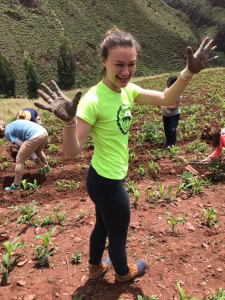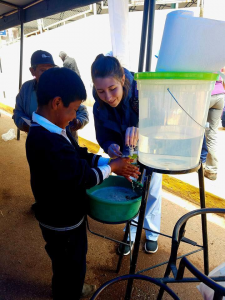
Cultural Exploration in Cusco
Ohio Wesleyan Students Volunteer, Study Social Issues in Peru
Name: Meaghan Teitelman ’18
Major(s): French and Sociology & Anthropology
Minor: Spanish
Hometown: Concord, Massachusetts
Name: Alyssa DiPadova ’19
Major(s): Latin American Studies, Spanish, and Politics & Government
Minor: History
Hometown: Cleveland, Ohio
Experience: Theory-to-Practice Grant, “Cultural Exploration and Service in Cusco, Peru.”
Teitelman and DiPadova visited Peru for 11 days over winter break and volunteered at Maximo Nivel, where they completed four service campaigns. During their OWU Connection experience, they helped with dog care, assisted with a medical campaign, helped villagers farming in the mountains, and spent a day with developmentally delayed children. They also studied social issues tied to the legacy of the Inca people.
Lessons learned
Teitelman: “Academically, (the trip) had a strong impact on my understanding of my abilities in Spanish, and it motivated me to continue my studies. Before the trip, I knew I was fairly comfortable speaking Spanish, but being forced to use this language daily in Cusco made me more comfortable in my abilities. ...

“Professionally, I think I gained many travel skills and communication skills. Working with different organizations, tour guides, and meeting tourism professionals taught me a lot. … Additionally, the completion of a grant and the necessity of budgeting and being very organized are important skills that were reinforced.
“Personally as well, I think I became more confident in these areas and in my own abilities to try new things. This will make me a better and more globally conscious traveler in the future.
“Finally, being in Cusco spurred a lot of intellectual growth. After years of study of indigenous groups and their fates in this globalizing and modernizing world, it was incredible to see these people hold fast to their traditions despite modernization. It was encouraging and refreshing, and it really made me think about how preservation efforts could succeed.
“That being said, the Quechua speaking population in Peru is dwindling, and each generation has fewer speakers than the one before it. I hope that many retain the attitude of one of our tour guides, who believed that to speak Quechua was to connect to the strength and power of long-ago ancestors, something that should never be given up.”
DiPadova: “Firstly, I feel that living in a Spanish-speaking country even just for 11 days has significantly improved my Spanish language skills.
“Being pushed on many occasions to converse in Spanish has not significantly improved my vocabulary or grammar, but it has taught me that when practicing another language, rather than stopping myself every so often to think about how to say certain phrases or how to conjugate certain verbs, I have to continue speaking and listening.

“It has completely changed my mindset. Before, I was caught up on not making mistakes, and I feel that really hurt my ability to converse in Spanish. Now, I know that I can make mistakes and still have productive conversations, and that is how language skills improve.
“Furthermore, this opportunity has given me a stronger sense of what I want to do in the future and how I want to utilize my Latin American Studies major. Volunteering with Maximo Nivel, even though it was only for one week, gave me a more personal look into the struggles of the people in Peru and similarly that those in Latin America as a whole are facing.
“This experience encouraged me to write another Theory-to-Practice Grant to spend three weeks in Guatemala as a human rights intern because I feel I have a more specific goal for myself, which includes working for organizations, such as NGOs or government agencies, that focus on fighting for human rights for disadvantaged populations.
“Overall, because I knew I would only be in Peru for about 11 days, I did not expect to come away from this experience knowing the wide array of information that I do now.
“I feel such a unique experience like this has given me so much valuable insight into various aspects of Peruvian culture and history, and into Latin America as a whole. I cannot begin to describe how influential this trip has been for me.”
Why I chose Ohio Wesleyan
Teitelman: “I felt that it had a wide variety of opportunities for me.”
DiPadova: “I really wanted to go to a small school where I’d be able to have strong relationships with my peers and my professors. I also love how many different international backgrounds are represented here.”
My plans after graduation
Teitelman: “After graduation, I am going to be doing a French teaching fellowship at an independent school.”
DiPadova: “I wish I knew for sure. The only prospect I’ve considered is completing a master’s degree in Latin American Studies, and obtaining a career that pertains to the region and allows me to practice my Spanish.”
